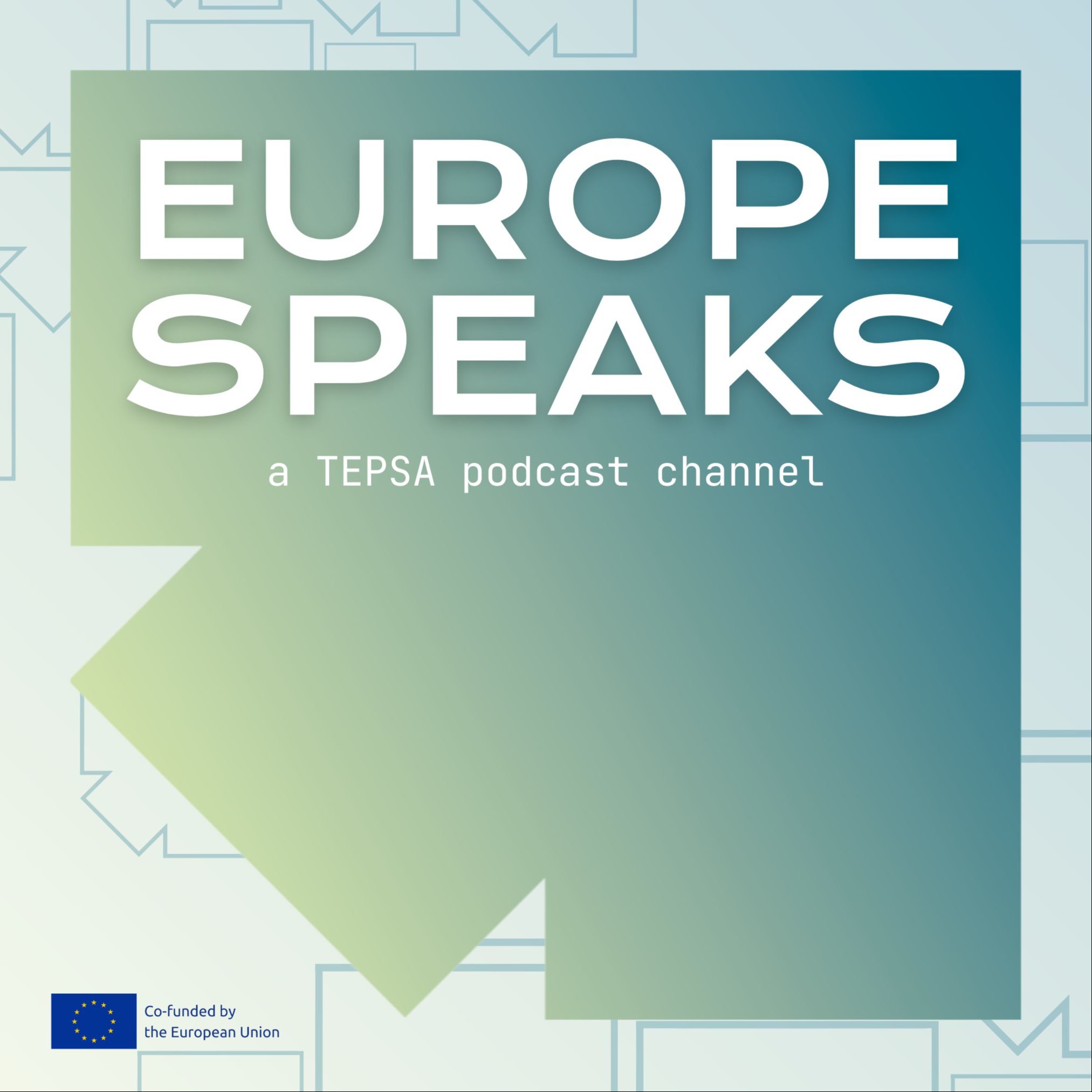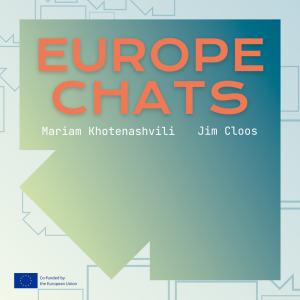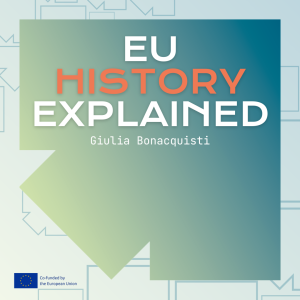
Welcome to ‘Europe Speaks’, a podcast channel by the Trans European Policy Studies Association (TEPSA) where we explore everything to do with the European Union: history, current affairs, and the future of Europe. We publish regular podcasts on all these topics, including EuropeChats with Jim Cloos and Mariam Khotenashvili, and a series of other webinars, explainers, and interviews with the world’s leading experts on the EU!
Episodes

Thursday Oct 20, 2022
EuropeChats – Why are Trans-European Networks SO Important?
Thursday Oct 20, 2022
Thursday Oct 20, 2022
One of the greatest benefits the EU has given to its Member States, beyond the political and economic integration on which it was founded, is the integration of infrastructures. There is no more visible example of this than in transport connectivity. In this episode of EuropeChats, TEPSA Secretary-General and long-time EU insider Jim Cloos sits down with former Director-General for Energy and Transport Matthias Ruete for a discussion on Trans-European Networks. What are they? Where do they come from? And why are they so important? These are some of the questions we will tackle in this episode of EuropeChats.
Matthias Ruete is a longstanding European practitioner. Starting off as a "mildly Eurosceptic professor at an English university", he eventually joined the European Commission in 1986, climbing the ranks until he was appointed to lead the Directorate-General for Energy and Transport (DG TREN) in 2006. He also led the Migration and Home Affairs file at the Directorate-General for Migration and Home Affairs (DG HOME) between 2014 and 2017. Since leaving a role as special adviser to the European Commission, dealing with energy policy among other files, Ruete has worked as one of eleven European Transport Coordinators for the European Rail Traffic Management System.
EuropeChats is is the flagship podcast of TEPSA and it is part of the TEPSA Podcast Channel “Europe Speaks”
Music: Worakls, 22 September 2014, Salzburg, Hungry music

Tuesday Jul 12, 2022
EuropeChats – EU Sanctions Policy
Tuesday Jul 12, 2022
Tuesday Jul 12, 2022
Russia has been waging a full-scale war against Ukraine for almost four months. The European Union has adopted six packages of sanctions against Russia in this period. The first package aimed at dissuading Russia from starting the war, the subsequent packages have tried to convince Russia to stop. More limited sanctions against Russian individuals have actually been in place since 2014, when Russia first invaded Ukraine.
What can sanctions achieve? How do EU sanctions actually work? How are they decided? What role do they play in the EU’s foreign policy? These are some of the questions we will tackle in this episode of EuropeChats.
In this episode, we discuss the role of sanctions in EU policy more generally, and the role they are playing in the European Union's response to Russia's war of aggression in Ukraine. TEPSA Executive Director Mariam Khotenashvili discussed with TEPSA Secretary-General and former Deputy Director General for General and Institutional Policy at the General Secretariat of the Council of the European Union Jim Cloos.
EuropeChats is is the flagship podcast of TEPSA and it is part of the TEPSA Podcast Channel “Europe Speaks”
Music: Worakls, 22 September 2014, Salzburg, Hungry music

Tuesday Jun 28, 2022
EU History Explained - The United States and European Integration (Part 2)
Tuesday Jun 28, 2022
Tuesday Jun 28, 2022
In this new episode of #EUHistoryExplained, Giulia Bonacquisti, Project Manager at the Trans European Policy Studies Association (TEPSA), takes a look at the role the United States played in the history of European integration.
In this podcast, we take a look back over decades of European integration, highlighting key moments where US involvement was, or was not, a crucial impetus for further integration, and analysing the changing attitudes of the US government towards the European project over the years. We can distinguish two main phases in the US’ attitude towards European integration: a first phase, from the end of World War II to the end of the 1960s, marked by a strong support; and a second phase, starting from the Nixon administration, where increasing economic and political competition from the European Economic Community resulted in a more ambivalent US attitude. Part 2, deals with the second phase of relations in the second half of the post-war years.
EU History Explained is TEPSA's series exploring the origins of the modern EU. If you have ever wondered how the European Union of today came to be, or what lies behind the talk of politics being shaped in 'Brussels', then this is the series for you!
We would like to thank the Historical Archives of the European Union at the European University Institute for their contribution.
Script: Giulia Bonacquisti
Recording & Editing: Eva Ribera & Hugh Evans
Music: Garrett Bevins - Infinite - Infinite (Wondershare Filmora X)

Tuesday Jun 21, 2022
EU History Explained - The United States and European Integration (Part 1)
Tuesday Jun 21, 2022
Tuesday Jun 21, 2022
In this new episode of #EUHistoryExplained, Giulia Bonacquisti, Project Manager at the Trans European Policy Studies Association (TEPSA), takes a look at the role the United States played in the history of European integration.
In this podcast, we take a look back over decades of European integration, highlighting key moments where US involvement was, or was not, a crucial impetus for further integration, and analysing the changing attitudes of the US government towards the European project over the years. We can distinguish two main phases in the US’ attitude towards European integration: a first phase, from the end of World War II to the end of the 1960s, marked by a strong support; and a second phase, starting from the Nixon administration, where increasing economic and political competition from the European Economic Community resulted in a more ambivalent US attitude. This podcast, the first of two parts dealing with US influence on European integration, deals with the first phase, in the early years of the European project.
EU History Explained is TEPSA's series exploring the origins of the modern EU. If you have ever wondered how the European Union of today came to be, or what lies behind the talk of politics being shaped in 'Brussels', then this is the series for you!
We would like to thank the Historical Archives of the European Union at the European University Institute for their contribution.
Script: Giulia Bonacquisti
Recording & Editing: Eva Ribera & Hugh Evans
Music: Garrett Bevins - Infinite - Infinite (Wondershare Filmora X)

Monday May 16, 2022
Monday May 16, 2022
In the first half of 2022, the European Union finds itself at a crossroads. Two years of a global pandemic and Russia’s war of aggression against Ukraine have set into motion a major geopolitical crisis cutting to the very heart of EU policy.
Three countries (Ukraine, Georgia, and Moldova) are working their way towards accession to the EU, their clear European choice a thorn in Russia’s side. In an effort to extend his sphere of influence, Russian President Vladimir Putin is de-facto occupying territory in all three countries.
None of these countries are in NATO although Ukraine and Georgia have been knocking on the door for almost twenty years. All three countries have strong European aspirations. The upcoming European Council in June might decide to recognise the three countries as candidates for membership. The European Commission is currently preparing its opinions on the three applications.
In this discussion with special guest Richard Youngs, we discuss the EU membership prospects of these three countries. Richard Youngs is a leading European expert on the topic of EU accession, the neighbourhood, and conflict. He is a Senior Fellow at the Democracy, Conflict, and Governance Program of Carnegie Europe, Professor at the University of Warwick, visiting professor at the College of Europe, and author of over 15 books on EU foreign policy, democracy and Eastern Europe.
EuropeChats is is the flagship podcast of TEPSA and it is part of the TEPSA Podcast Channel “Europe Speaks”
Music: Worakls, 22 September 2014, Salzburg, Hungry music

Thursday Apr 14, 2022
EuropeChats – European Council Conclusions
Thursday Apr 14, 2022
Thursday Apr 14, 2022
In the first episode of EuropeChats for 2022, we discuss one key aspect of the European Council’s functioning: the conclusions issued at the end of each meeting. We will try to understand how they have evolved, what their key purpose is and how they come about. At the end of our talk, we will also suggest a few recommendations on how to best write and use European Council Conclusions.
The European Council gathers together the Heads of State or Government from the European Union’s Member States. It has over the years become the EU’s agenda setter, shaping key milestones in European integration. In the early years, the European Council did not exist - and it had no formal role or legal basis in the Treaties. Nevertheless, the Heads of State and Government, wanting to meet to discuss the progress of EU affairs and common policies, started to meet in summits in the 1960s and 1970s. The European Council, in a sense, created itself. And since that time it has had its role formalised and clearly defined.
TEPSA Secretary-General Jim Cloos drafted European Council Conclusions for years as part of his role as Deputy Director General for General and Institutional Policy at the General Secretariat of the Council of the European Union. He knows how the conclusions have changed over time, how they are written, who has an input on their content, and ultimately, he knows how to read past their often complex and confusing language. If you ever wanted to understand more about the crucial role of the EU's agenda setter, he is a leading expert!
EuropeChats is is the flagship podcast of TEPSA and it is part of the TEPSA Podcast Channel “Europe Speaks”
Music: Worakls, 22 September 2014, Salzburg, Hungry music

Monday Mar 14, 2022
Monday Mar 14, 2022
In this new episode of EU History Explained, Giulia Bonacquisti, Project Manager at the Trans European Policy Studies Association (TEPSA), takes a look at the history of one of the most important Institutions of the European Union: the European Council.
The European Council gathers together the Heads of State or Government from the European Union’s Member States. It has over the years become the EU’s agenda setter, shaping key milestones in European integration, but despite this, its history as a formal Institution of the EU doesn’t go back too far.
In this video, we take a look back over decades of European integration, tracking the development of the summits that would later become the formal European Council. Starting in the 1960s as informal summit meetings spearheaded by France in an effort to limit the supranational character of the European Community, a number of developments brought about the end of the summit practice, and the foundation of the European Council. In a context of international instability, the need for momentum to integrate further, and pushed for by French President Valéry Giscard d’Estaing and German Chancellor Helmut Schmidt, the late 1960s and early 1970s brought about the birth of the European Council. From there, we move through several Treaty changes, culminating in the signing of the Lisbon Treaty in 2007, which formalised the European Council as an EU Institution and defined its current role.
EU History Explained is TEPSA's video series exploring the origins of the modern EU. If you have ever wondered how the European Union of today came to be, or what lies behind the talk of politics being shaped in 'Brussels', then this is the series for you!
We would like to thank the Historical Archives of the European Union at the European University Institute and Roland Parr for their contribution.
Script: Giulia Bonacquisti
Recording & Editing: Tanguy Babled & Hugh Evans
Music: Garrett Bevins - Infinite - Infinite (Wondershare Filmora X)

Monday Jan 31, 2022
EU History Explained - The EU & the UK: A Troubled Relationship
Monday Jan 31, 2022
Monday Jan 31, 2022
In this new episode of #EUHistoryExplained, Giulia Bonacquisti, Project Manager at the Trans European Policy Studies Association (TEPSA), takes a look at the troubled history of the UK's relations with Europe.
It is two years since the United Kingdom formally left the European Union, and over one year since the end of the #Brexit transition period. But the difficult relations between the UK and the EU didn't start in 2016. From a stop-start accession process filled with hurdles and challenges, through a series of opt-outs from EU policies, and culminating in a tense series of Brexit negotiations, the UK's involvement in the European project has been troubled since the start.
In this video, we take a look back over the last 90 years of European integration, from the British perspective. Beginning with Churchill's championing of a European project without British involvement in the 1930s, and moving through successive British governments' attempts to balance their interests between the Commonwealth & USA and the emerging Common Market in Europe, the path to British accession to the EEC in 1973 was a difficult one. But the trouble didn't end there, and we also explore the decades of British membership, moving through Thatcher's critiques of the Community and tense debate over the British contribution to the European budget, and a series of British opt-outs from major EU policies such as Schengen and the Europe. Finally, we explore the impact of all this history on the current state of relations. After Brexit, the UK has gone from a member with many opt-outs to an outside seeking opt-ins. What can the history of UK-EU relations teach us about their future?
EU History Explained is TEPSA's video series exploring the origins of the modern EU. If you have ever wondered how the European Union of today came to be, or what lies behind the talk of politics being shaped in 'Brussels', then this is the series for you!
We would like to thank the Historical Archives of the European Union at the European University Institute for their contribution.
Script: Giulia Bonacquisti
Recording & Editing: Tanguy Babled & Hugh Evans
Music: Garrett Bevins - Infinite - Infinite (Wondershare Filmora X)

Monday Dec 20, 2021
EuropeChats – Europe 2021-2022: Looking Back & Thinking Ahead
Monday Dec 20, 2021
Monday Dec 20, 2021
In this episode of EuropeChats, Jim and Mariam look back at the challenges faces by the EU in 2021, and think ahead to 2022 to consider what may lay ahead for the European project.
2021 remained mired in the ongoing COVID-19 pandemic, and 2022 looks set to continue that trend, in a context of disappointing global vaccination rates and the new Omicron variant of the disease. But Europe was not only face by the challenge of coronavirus in 2021: a hostile global environment , not only when looking at Russia and China, but also at Europe's borders, played its part in the story of 2021, and the EU must seek true strategic autonomy to deal with it in 2022 and beyond. The climate emergency continues, and despite good moves in the right direction, the existential thread of climate catastrophe remains. But it's not all doom and gloom, so check out this latest episode and enjoy the discussion. See you in 2022 for more EuropeChats!
EuropeChats is is the flagship podcast of TEPSA and it is part of the TEPSA Podcast Channel “Europe Speaks”
Music: Worakls, 22 September 2014, Salzburg, Hungry music

Wednesday Dec 01, 2021
EuropeChats – European Solidarity in Action
Wednesday Dec 01, 2021
Wednesday Dec 01, 2021
In this special episode of EuropeChats, we are joined by Prof. Michael Kaeding. Michael is Jean Monnet Chair ad personam at the University of Duisburg Essen, and along with Johannes Pollak and Paul Schmidt, he is co-editor of a series of books stemming from the TEPSA Network.
The "Views from the Capitals" series draws on the expertise of the TEPSA Network to produce books that analyse topical European issues from the perspective of each EU Member State and neighbouring countries, and help understand the future of the European project. The latest edition, "European Solidarity in Action and the Future of Europe: Views from the Capitals", is the topic of today's episode.
The book sheds light on how Member States and EU neighbours reacted to the COVID-19 pandemic through the lens of European solidarity, what they expect from the EU, and other Member States, and how they are ready to contribute to common action. The volume reveals how European countries experience and perceive solidarity from the EU and towards the EU in different policy dimensions, such as intra-EU mobility, healthcare and financial and economic aspects of Europe’s recovery.
The spread of COVID-19 appears to have turned the world upside down. The pandemic has put enormous stress on the global economy. Its impact on the European Union, its Member States and neighbouring countries poses the biggest challenge since its existence. It is the latest stress test of the Europe’s solidarity after being pummeled by the eurozone debt turmoil, the migration crisis of 2015-16 and Brexit. Whether the EU can bounce back and what shape the recovery will take depends on what actions the member states are willing to take individually and collectively in the days, weeks and months to come.
We're discussing these topics and many more, so check it out!
EuropeChats is is the flagship podcast of TEPSA and it is part of the TEPSA Podcast Channel “Europe Speaks”
